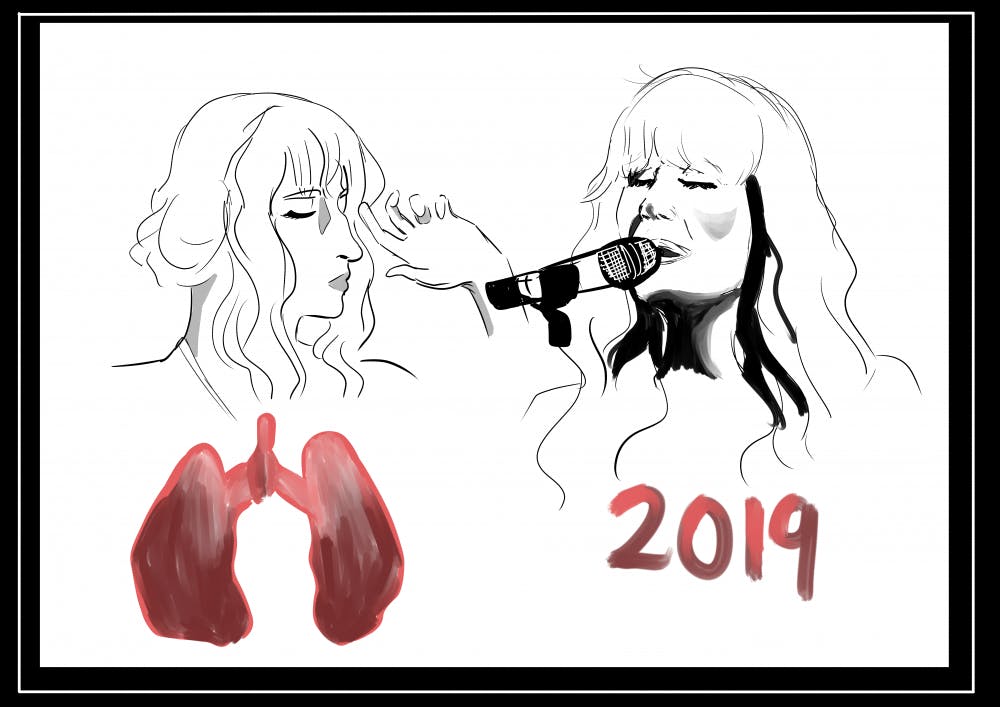The middle of autumn is the perfect time to celebrate the ten–year anniversary of Florence + the Machine’s Lungs. The band, lead by Florence Welch, released its debut album in 2009, and in the years following, Welch has earned her reputation as melancholia personified.
The somber, beautifully tortured female artist is not a trope that belongs to Welch alone—the industry is full of Lana Del Reys. However, Welch was not only the first in this current generation of “Sad Girls,” but she also formed a definitive version of the trope that nobody has been able to truly replicate.
Lungs opens with “Dog Days Are Over,” which was not only the song that caught everyone’s attention back in 2009, but also sets the tone for the rest of the album. The song blossoms into a whirlwind of strings and drumbeats, but reminds us to leave all that we love behind and survive on our own.
From the emotional existentialism of the chorus of “Ghosts (I'm Not Calling You a Liar)” to the thrumming heartbeat of the drum in “My Boy Builds Coffins,” Lungs blends the celestial with the mundane.
“And my running feet could fly / Each breath screaming / 'We are all too young to die,'” Welch sings in the chorus of “Between Two Lungs,” follows shortly after the bloody metaphors and inundating guitar of “Kiss With a Fist.”
Using synths and grounding drums, Welch infuses Lungs with these two seemingly disparate momenta that carry the listeners with the sense of a greater narrative.
In other words, Lungs is theatrical. However, it isn’t the drama of a high school theatre kid. It’s the high–stakes heart pumping drama of someone running. It doesn’t matter where they’re going or why. It does not matter if they are even making any progress. Lungs is an album that is built upon a wild sadness that rejects resignation.
And that is why Welch still stands unique amidst her successors. She is not trapped in her sadness. Amid the poetry of “Howl,” Welch liberates herself from the realm of reality as she likens her anger to that of a werewolf, clawing at those who wrong her. She allows herself to hunt, to rage, to feel, all without the concerns of those who may see her.
Of course, other artists use their music to express things that they would often not say to anyone’s face. In fact, most do. However, most strive to create an illusion of relatability to form a connection with their audience. Welch has other goals. She strives for connection, but instead of appealing to her audience’s experiences, she takes them away with her.
When people talk about Welch or her music, they don’t so much talk about her appearance or her voice or even the minute details of her poetry. They talk about the way she makes them feel. They talk about how she performs on her own terms and fills each song with an unbridled femininity that is allowed to scream and rage without constraint. She is Florence, and she sings about every part of that.
Her sadness is not relatable. It is shared. It is the sadness that makes someone look inside themselves and examine the parts that they hide from others’ gazes.
“A falling star fell from your heart and landed in my eyes / I screamed aloud, as it tore through them / And now it's left me blind,” sings Welch in "Cosmic Love" as she sets the example and encourages her audience to follow.
And Welch was ahead of her time. 2019 has been filled with theatricality in music. 2019 belongs to Lizzo, whose mood may be on the opposite end of the spectrum from that within Lungs, but whose anthems boast the same emotion–driven individuality that infuses each lyric of “Drumming Song.” This style forces us to evaluate our own lives and our own sadness and figure out what we are going to do about it.
Though Welch’s more recent albums feature a greater intimacy and stillness, we still see specters of Lungs and its beating drums that are constantly counting down to something. And that something is different for all of us.

